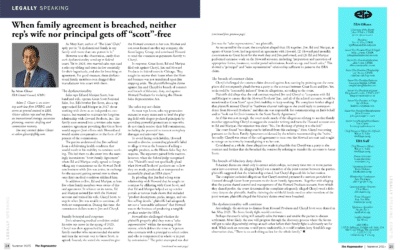It was Napoleon, after retreating from Moscow in 1812, who famously remarked, “There is only one step from the sublime to the ridiculous.”
In a compelling federal appellate opinion issued slightly more than 200 years later, the court found nothing remotely sublime about State Farm and its counsel labeling their opponent’s argument “ridiculous.”
On the stipulated facts of the case, State Farm’s dismissive tone might sound understandable. Barbara Bennett, after all, was a pedestrian moments before she was struck by Robert Pastel’s vehicle in Garfield Heights, Ohio, and thrown onto the car’s hood. Yet, she still claimed to be an “occupant” of Pastel’s vehicle in seeking coverage under his State Farm insurance policy.
State Farm relied on the policy language that covered only “occupants” of insured vehicles in rejecting Bennett’s claim.
She then brought her declaratory judgment action seeking coverage under the policy. The parties stipulated that the negligence of State Farm’s insured driver caused Bennett to sustain bodily injuries.
Agreeing with State Farm, the federal district court in Akron found Bennett was not such an occupant and granted summary judgment.
When she appealed this ruling to the 6th U.S. Circuit Court of Appeals, State Farm dismissed her argument as “ridiculous,” a pejorative that did not sit well with the court.
“There are good reasons not to call an opponent’s argument ‘ridiculous,’” began the decision in Bennett v. State Farm Mutual Auto. Ins. Co., No. 13-3047 at *1 (6th Cir. Sept. 24, 2013).
The 6th Circuit identified these reasons as civility, “the near-certainty that overstatement will only push the reader away” and the preferred practice of setting out the facts and letting the court form its own opinions.
“But here,” noted the court, “the biggest reason is more simple: The argument that State Farm derides as ridiculous is instead correct.” Id. at *1-2.
Citing the bedrock principle of contract law that “parties to a contract can define its terms as they wish,” the court turned to the State Farm policy language. It turns out the term “occupying” was defined to mean “in, on, entering or alighting from” a vehicle.
Undisputed as it was that Bennett was injured while on the hood of the insured’s vehicle, the court readily concluded that she was an “occupant” under the policy and therefore entitled to coverage.
State Farm erroneously relied on a common sense view of “occupying,” rather than its own policy’s definition.
While the court expressly disapproved of the derision State Farm heaped on Bennett’s “ridiculous,” yet prevailing, argument, it essentially found the simplicity of her approach in holding her opponent to the language in its insurance contract to be sublime.
The two may indeed be separated by just a step, but at least in the context of insurance coverage, it was a ridiculously significant step.



